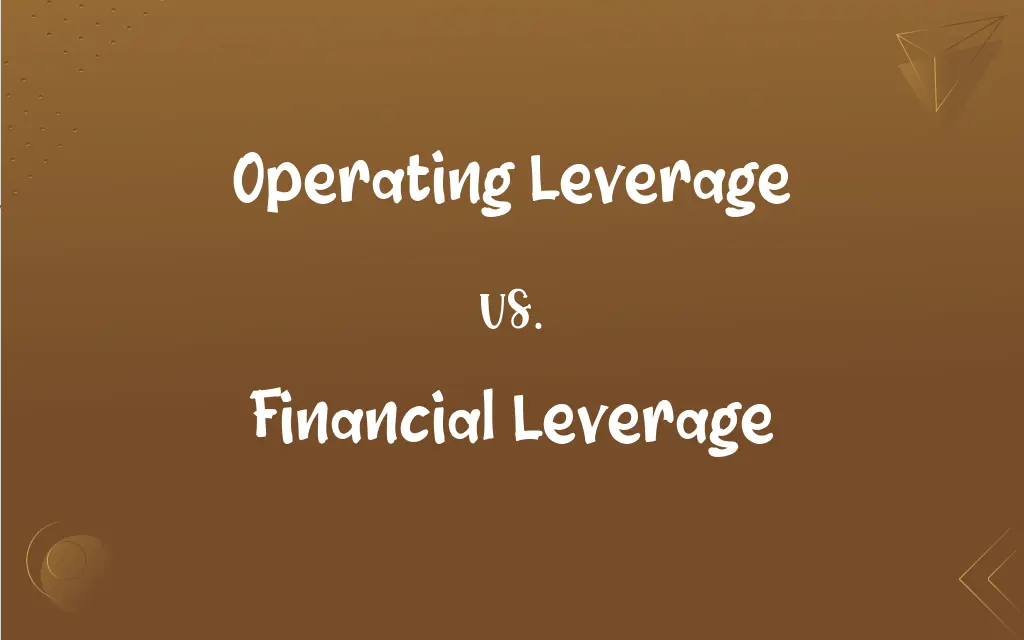Operating Leverage vs. Financial Leverage: What's the Difference?
Edited by Aimie Carlson || By Janet White || Published on November 8, 2023
Operating Leverage measures a firm's fixed costs as a percentage of its total costs, while Financial Leverage indicates the extent a firm uses debt financing over equity.

Key Differences
Operating Leverage focuses on the relationship between a firm's fixed and variable costs, signifying how a change in sales affects operating income. In contrast, Financial Leverage centers on the proportion of debt to equity in a firm's capital structure, denoting how it funds its operations and growth.
Operating Leverage showcases the sensitivity of a firm's operating income to fluctuations in sales volume. On the other hand, Financial Leverage magnifies the effects of changes in operating income on the firm's net income and earnings per share.
Companies with high Operating Leverage have a large proportion of fixed costs, making them more sensitive to sales variations. Whereas, firms with high Financial Leverage bear more debt, increasing their risk of financial distress but also potential returns on equity.
The benefit of high Operating Leverage is that when sales rise, a larger portion of the increase translates to operating income due to the predominance of fixed costs. Meanwhile, high Financial Leverage can amplify returns to shareholders when things go well, but can also magnify losses.
The risk associated with Operating Leverage arises from its reliance on sales volume to cover fixed costs. Conversely, the risk tied to Financial Leverage stems from debt obligations and interest payments, which must be met regardless of how well the business performs.
ADVERTISEMENT
Comparison Chart
Nature of Leverage
Concerned with fixed vs. variable costs.
Relates to the mix of debt and equity in financing.
Effect on Profit
Amplifies the effect of sales changes on operating income.
Magnifies the effect of operating income changes on net income.
Source of Risk
Sales volume variations and covering fixed costs.
Debt obligations and interest payments.
Potential Benefit
Greater proportion of sales increases contribute to operating income.
Can enhance returns on equity during favorable conditions.
Key Metric
Degree of Operating Leverage.
Degree of Financial Leverage.
ADVERTISEMENT
Operating Leverage and Financial Leverage Definitions
Operating Leverage
It showcases the sensitivity of operating income to sales fluctuations.
A company with high Operating Leverage will see a significant jump in operating income with a slight increase in sales.
Financial Leverage
It amplifies the effects of changes in operating income on shareholders' returns.
With increased Financial Leverage, a small change in operating income can lead to significant shifts in earnings per share.
Operating Leverage
Operating Leverage gauges the fixed cost structure of a firm.
High Operating Leverage indicates that most of a company's costs are fixed.
Financial Leverage
Financial Leverage spotlights the risks and potential rewards of using borrowed funds.
Companies using Financial Leverage aim to earn a return on investment exceeding the interest expense.
Operating Leverage
It's the ratio of fixed costs to variable costs.
With predominant fixed costs, a firm's Operating Leverage rises.
Financial Leverage
It reflects a firm's dependence on external financing.
High Financial Leverage indicates a company relies heavily on debt over equity.
Operating Leverage
Operating Leverage emphasizes the impact of operational decisions on profit.
Deciding to enter into a long-term lease increases a firm's Operating Leverage.
Financial Leverage
Financial Leverage underlines the firm's ability to meet its debt obligations.
Companies with too much Financial Leverage may struggle during economic downturns.
Operating Leverage
Operating Leverage highlights the break-even point where total revenue equals total costs.
High Operating Leverage means a higher sales volume is needed to break even.
Financial Leverage
Financial Leverage measures the proportion of debt in a firm's capital structure.
A company funded primarily by debt has high Financial Leverage.
FAQs
What does Financial Leverage signify?
Financial Leverage indicates how much a firm relies on debt financing compared to equity.
Is high Financial Leverage always risky?
While it can boost returns, high Financial Leverage also increases the risk of financial distress.
Which leverage type emphasizes sales volume's impact on income?
Operating Leverage.
What does Operating Leverage measure?
Operating Leverage measures a firm's fixed costs relative to its total costs.
Can Financial Leverage enhance shareholder returns?
Yes, when used judiciously, it can amplify returns, but also losses.
Which leverage type deals more with funding decisions?
Financial Leverage.
How does Operating Leverage affect a firm's break-even point?
High Operating Leverage raises the sales volume needed to cover fixed costs and break even.
Are companies with high Operating Leverage more affected by economic downturns?
Yes, since they rely heavily on sales volume to cover fixed costs.
How does interest rate impact Financial Leverage?
Higher interest rates make debt more expensive, influencing a company's Financial Leverage decisions.
Is a company with zero Operating Leverage risk-free?
No, but its operating income would be less sensitive to sales changes.
Can Operating Leverage change over time?
Yes, as a firm's cost structure evolves.
Why might a firm choose high Financial Leverage?
To magnify potential returns, especially if it can earn more than the interest expense.
Is Financial Leverage always related to borrowing?
Primarily, but it also considers other long-term obligations.
Does Operating Leverage consider interest expenses?
No, it's more concerned with operational costs.
What's a key metric for Operating Leverage?
Degree of Operating Leverage.
How can a firm decrease its Financial Leverage?
By repaying debt or issuing more equity.
Are firms with high Operating Leverage more profitable?
Not necessarily; while they benefit more from sales increases, they're also more vulnerable to declines.
Can startups have high Operating Leverage?
Yes, especially if they invest heavily in fixed assets or incur fixed operational costs.
Can a firm have both high Operating and Financial Leverage?
Yes, though this would amplify both operational and financial risks.
What happens if a company defaults due to high Financial Leverage?
It may face bankruptcy or restructuring.
About Author
Written by
Janet WhiteJanet White has been an esteemed writer and blogger for Difference Wiki. Holding a Master's degree in Science and Medical Journalism from the prestigious Boston University, she has consistently demonstrated her expertise and passion for her field. When she's not immersed in her work, Janet relishes her time exercising, delving into a good book, and cherishing moments with friends and family.
Edited by
Aimie CarlsonAimie Carlson, holding a master's degree in English literature, is a fervent English language enthusiast. She lends her writing talents to Difference Wiki, a prominent website that specializes in comparisons, offering readers insightful analyses that both captivate and inform.






































































